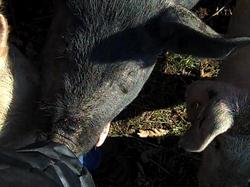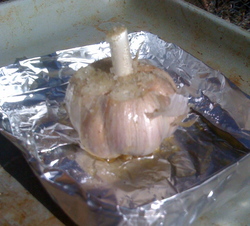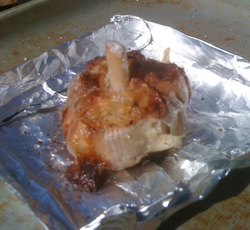Visit to Zingerman's Cornman Farms

Cornman Farms manager Mark Baerwolf kneels in front of arugula and cabbage.
Corinna Borden | Contributor
Intriguing enough, the article talks about the importance of traceability in the food supply because America “is one of the most dangerous places in the developed world to eat…26,000 cases [of food poisoning] per 100,000 population. In Britain, where people consume far fewer hamburgers, generally eat out less often and buy nowhere near as many ready-meals, there are 3,400 cases of food poisoning per 100,000 population annually.”
I don't know whether or not Americans' desire to eat TV dinners and sliders can really make a 765% difference in our food poisoning rates but I do think there is something to knowing where your food comes from. Knowing the animals have rooted in the earth and felt the warm sun on their flesh. Knowing the soil is being cared for and will be able to grow nutrient hungry crops for as long as the farmer desires.
I do not want to compare factory farms to sweatshops because I have never been a calf unable to turn around in my own feces nor have I been a 14 year old girl fainting from hunger after a 14 hour work day. I do believe "money talks." Your decision to spend money is a positive feedback loop for whatever you spent your money on - you are voting with your wallet. Common sense.
I like voting for businesses that focus on local ingredients, sustainability, and community. We are so lucky to be in Ann Arbor because there are so many great places to choose from. I have been affiliated with Zingermans since 2005 and had visited Cornman Farms with my husband in March to help dig parsnips. I was curious to return and see what the farm looked like before the frost - and to meet the pigs!
Cornman Farms is an enterprise started by Chef Alex Young in 2004, 8 miles from the restaurant where the food is served - Zingerman's Roadhouse. The farm also benefits from the collection of compost from both the Roadhouse and Zingerman's Bakehouse. Mark Baerwolf, the farm manager for Roadhouse Chef Alex Young, walked me around the fields.
The carrot bed was lacelike, the fronds a vibrant spring green against the dark soil. Mark Baerwolf spoke of Eliot Coleman's work in Maine with the Four Season Farm as his motivation to leave the carrots in the earth during the winter under a blanket of hay. Eliot Coleman and Barbara Damrosch, his wife, have written many books about "gardening the back half of the season," as Mark put it. Given that Michigan has a ample back half, they seem like good people to know about.
The tomato and the cucumber beds are now planted with winter rye (a grass) and hairy vetch (a legume). They work in tandem to feed the soil after a summer of hungry plants. As Mark described it the grass is a "nurse crop" for the legume because grass "comes up really quickly and establishes itself" protecting the legume for the time when it will go dormant in the cold. The legume in the spring then feeds nitrogen into the soil, evidenced by the round nodules on its roots. See this video from MSU extension to see the nodules.
We walked by the compost pile - resplendent with eggshells from Challah Bread and SourCream Coffee Cake and orange halves from the freshly squeezed orange juice at the Roadhouse. The entire pile steamed gently in the 50 degree weather - mute evidence to the bacterial content inside. They were able to use the hay bales from the Grillin with Food Gatherers as their brown matter to add to all of the fresh additions. You can check out this video of Mark describing the compost.
Chef Alex Young and his family started raising hogs this summer as his children's 4-H project. I had never been so close to pigs before, nor have I ever been greeted so enthusiastically!
They were very curious and nibbled on the bottom of my coat and my shoes. Some of the pigs have already been slaughtered and are being made into hams, bacon, chops, and loin for happy eating at the Roadhouse. I learned a neutered pig is called a barrow. I felt the hard bristles of their hair along their backs - my only reference point being the elephants I felt in India - elephant hair is longer and less coarse.

One of the curious pigs nibbles on the end of my knee length coat.
Corinna Borden | Contributor
We spoke of the dirty dozen. The Dirty Dozen is the list of fruits and vegetables that contain higher levels of pesticides: spinach, potatoes, apples, cherries, strawberries, and peaches to name a few. Cornman Farms believe, "if you grow healthy plants they will be able to fend off diseases," and so they have chosen not to use any chemicals.
"Really? No chemicals at all? Not even organically certified ones?" I ask.
Mark Baerwolf calmly looks at me. "There are some great tasting carrots grown using those different techniques." He pauses and looks over the fields. "We just don't want to use any chemicals."
I am humbled with his peace and clarity of purpose. "Okay. Fair enough."
The choice not to use chemicals does mean that Cornman Farms uses considerably more labor than other types of farming. For example, instead of spreading an herbicide on the bed of carrots, individual weeds were pulled out by hand. Instead of spraying the potato fields with fungicides, herbicides, and insecticides before, during, and after the potato season individual workers walked through the bushes with buckets of water and insecticide soap. They looked carefully at each plant and pulled off the potato bugs and put them in the buckets, thus leaving the "beneficial lady bugs, hover flies (which are awesome little bugs), and green lace wings." Spraying would have killed all of the bugs, good and bad.

Hard necked garlic prepped for roasting.
Corinna Borden | Contributor
Given my husband is out of town and would not object to a garlic wife, I felt comfortable roasting a whole head and enjoying it for lunch. I quickly learned why they are called hard neck. It was virtually impossible to cut through the neck, so I left it - a little handle for me to use. I poured olive oil, sage, and sea salt over the clove and popped it into the oven for 50 minutes on 350 degrees.

Roasted Hard necked garlic all ready to eat!
Corinna Borden | Contributor
And wow. It was incredible: sweet, nutty, not metallic or bitter, and buttery smooth. It tasted like the garlic of my dreams.
From the dark earth of the farm to my happy fork.
The Farm to Fork series focuses on local farms around Ann Arbor. If you would like me to visit your farm drop me a line and say hello. You can also check out my website!


Comments
Lydia
Fri, Nov 13, 2009 : 9:23 p.m.
Thank you for the tour through the farm! Healthy vegetables and happy pigs -- what a great place.
Jennifer Shikes Haines
Fri, Nov 13, 2009 : 8:37 a.m.
I love this series, Corinna. Fascinating article. This also makes me feel even better about the money I spend at the Roadhouse, etc.
Corinna Borden
Thu, Nov 12, 2009 : 2:43 p.m.
I hear you Jillian - those data are quite something to chew over.
Jillian D
Thu, Nov 12, 2009 : 11:10 a.m.
I find that the most personally-satisfying meals I make at home involve ingredients I have just picked from my own garden, so I love knowing that the same is true for Zingerman's Roadhouse. Fascinating (and scary) about how high food poisoning rates are in the US, I had no idea.